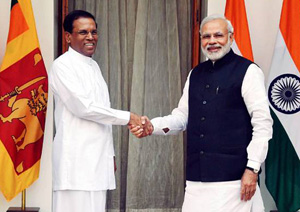Colombo, March 13: Prime Minister Narendra Modi on Friday said Sri Lanka has the potential to be India's strongest economic partner and it will have the first claim on India in its economic development.
Addressing the Sri Lankan parliament, Modi said: "My vision of an ideal neighbourhood is one in which trade, investment and technology flow easily across the border, where partnerships are formed with ease of routine."
India, Modi pointed out, was one the fastest growing major economies.
He said neighbours should have the first claim on India.
"I will be happy if India serves as a catalyst in the progress of our neighbours." He quickly added to loud thumping of desks by the MPs: "First claim (among) neighbours will be Sri Lanka."
Modi said Sri Lanka had the potential to be the strongest economic partner of India and assured that New Delhi would work to address various concerns to boost trade and make it more balanced.
He spoke of harnessing the potential of the Indian Ocean and increasing cooperation in South Asia and boosting connectivity.
He promised India's commitment to development partnership with Sri Lanka.
"We see it as the responsibility of a friend and a neighbour," he said, and added that India had committed $1.6 billion to Sri Lanka and today had committed $318 million to the railway sector.
In a tacit reference to devolving more powers to Tamil-majority Northern province, Modi said all countries in South Asia have to deal with the "issues of identities and inclusion, of rights and claims, of dignity and opportunity for different sections of our societies".
He said such issues have sometimes had tragic consequences in brutal terrorism and violence. But there have also been successful examples of peaceful settlements.
"Each of us has sought to address these complex issues in our own ways. However, we choose to reconcile them.
"To me something is obvious: Diversity can be a source of strength for nations," he said.
The Indian leader said a country became stronger when the aspirations of all its sections were accommodated.
"And when we empower states, districts and villages, we make our country stronger. You can call this my bias," he said, and added that he was a firm believer in cooperative federalism.
He said Sri Lanka had successfully defeated terrorism and brought the conflict to an end.
"You now stand at a moment of historic opportunity to win the hearts and heal the wounds across all sections of society," he said.
He referred to the Sri Lankan presidential election of January which led to the defeat of long-time president Mahinda Rajapaksa and catapulted Maithripala Sirisena to power.
The Sri Lankan elections were a reflection of the "collective voice of the nation - the hope for change, reconciliation and unity", he said.
"I am confident of a future of Sri Lanka, defined by unity and integrity; peace and harmony; and opportunity and dignity for everyone.
"I believe in Sri Lanka's ability to achieve it. It is rooted in our common civilizational heritage. The path ahead is a choice that Sri Lanka has to make.
"It is a collective responsibility of all sections of the society; and, of all political streams in the country. But I can assure you this: For India, the unity and integrity of Sri Lanka are paramount," he said.
Modi pushed for an ambitious Comprehensive Economic Partnership Agreement and said India can be a natural source of investment.
He said both can work together to harness the vast potential of the Ocean Economy and take the lead in increasing cooperation in South Asia.
"The security of our two countries is indivisible. Equally, our shared responsibility for our maritime neighbourhood is clear.
"India and Sri Lanka are too close to look away from each other. Nor can we be insulated from one another," he said.





Comments
Add new comment